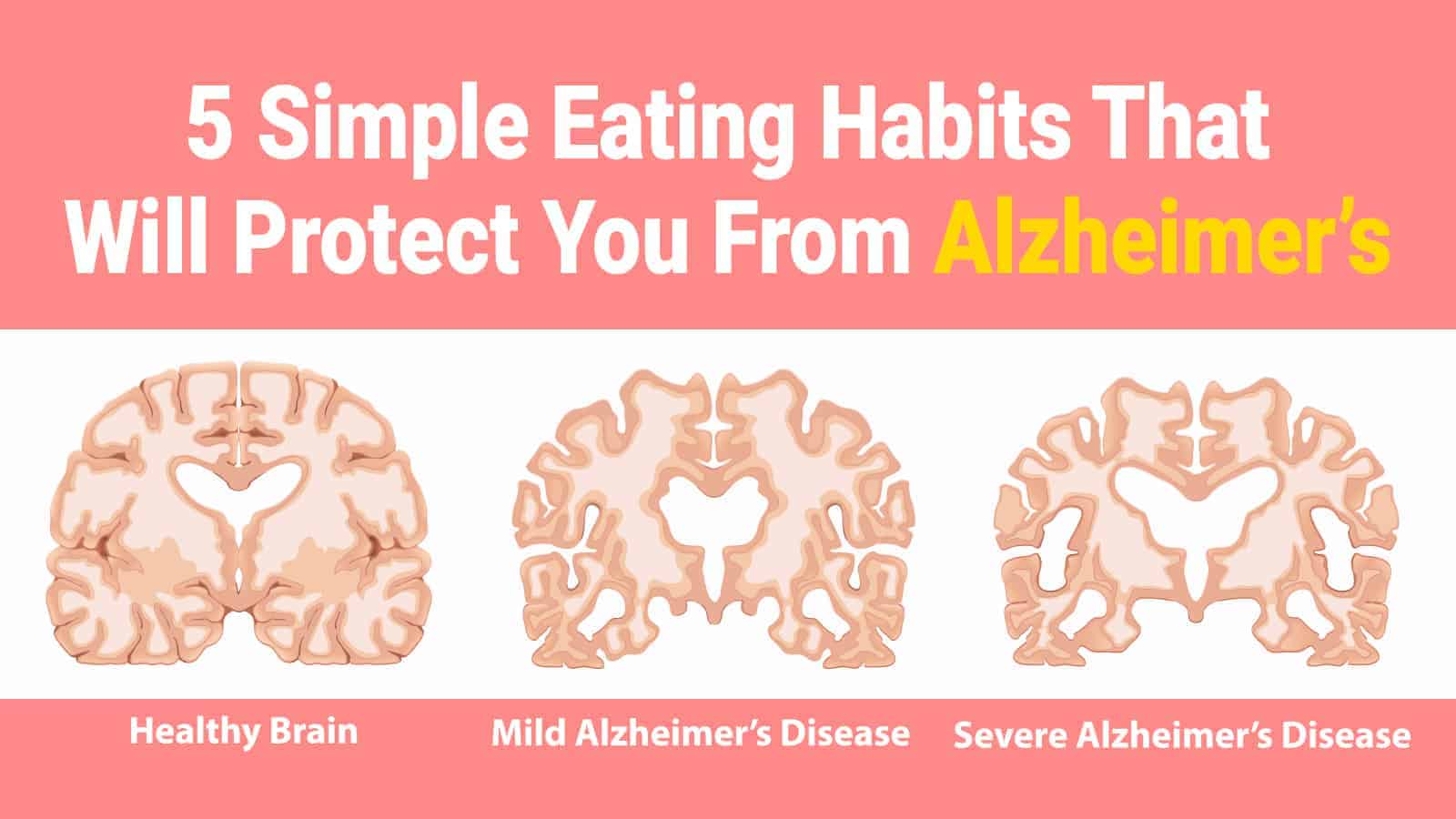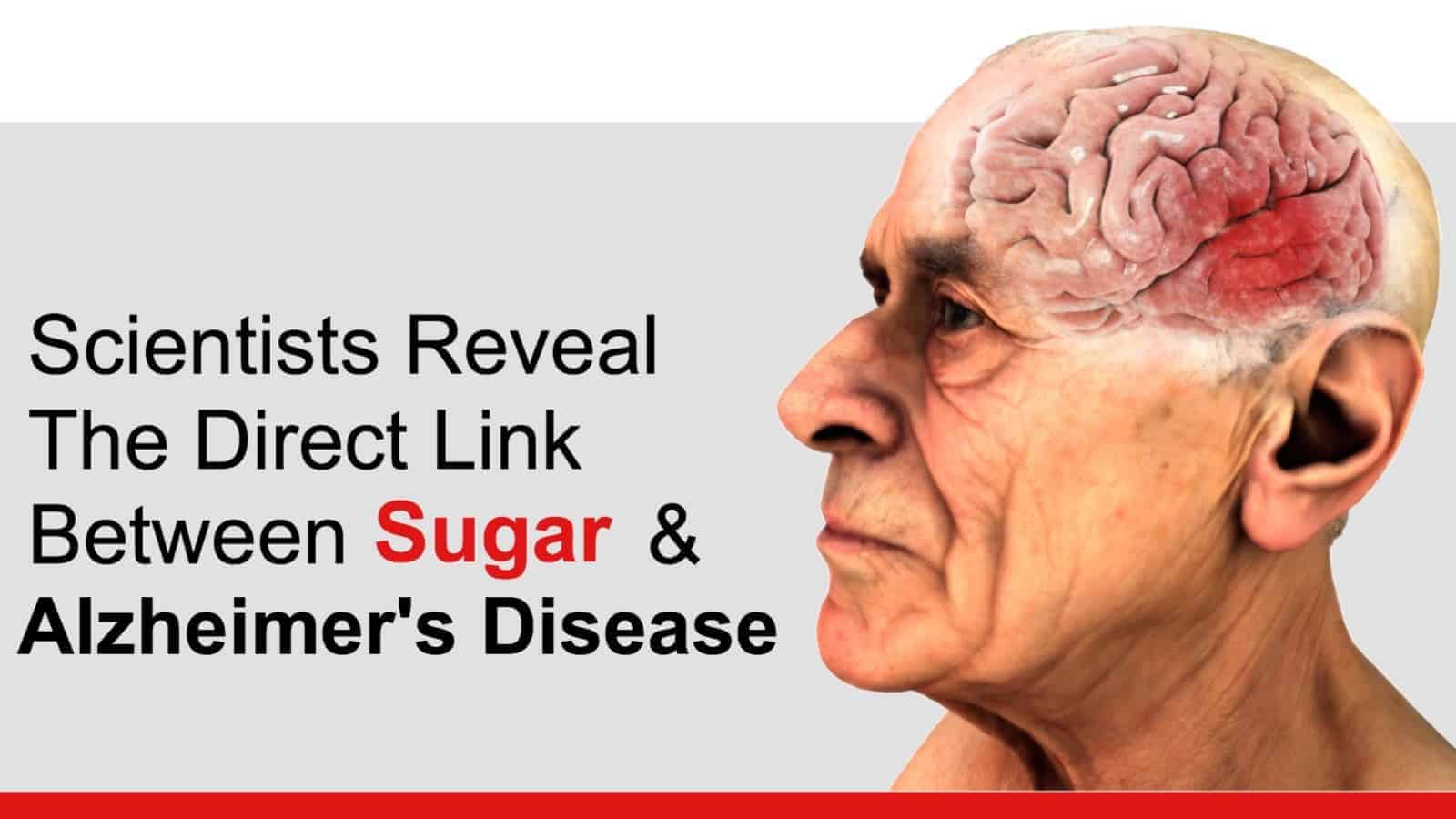For years we’ve been told that what we eat affects our cholesterol, heart, weight, etc. This is genuinely good advice – and very accurate. But something that’s not discussed nearly enough is how the foods we eat impacts the brain–epecially concerning Alzheimer’s. Make no mistake; our eating habits have a significant effect on our brain health.
Consider this study by Rush University Medical Center in Chicago: researchers developed a diet that they say reduces the risk of developing Alzheimer’s Disease by over 50 percent. More impressive, individuals who followed the prescribed diet only “moderately well” lowered their risk of Alzheimer’s by as much as one-third.
In this article, we are going to discuss the ways in which diet and lifestyle influences brain health. We’ll explain which eating habits are conducive to good brain health, along with the recommended portions of each food type. Finally, we’ll discuss those eating habits that can help protect you from Alzheimer’s!
A Quick Look at Alzheimer’s Disease
Alzheimer’s Disease is the 6th leading cause of death in the United States, killing more people than breast cancer and prostate cancer combined. Astonishingly and tragically, 1 in 3 senior citizens dies with Alzheimer’s or another type of dementia. While scientists and other medical experts have made progress reducing the numbers of deaths from certain medical conditions like cardiovascular disease, the number of people who die from Alzheimer’s has increased – up 145 percent between 2000 and 2017.
Early symptoms of Alzheimer’s include:
– Losing track of time or location
– Difficulties with solving problems
– An inability to work through previously familiar tasks
– Frequent memory loss that disrupts daily life
– Trouble speaking or writing
– Changes to mood and personality
– Withdrawing from social situations
– Increasingly poor judgment
Effects of Eating Habits on The Brain
“Like an expensive car, your brain functions best when it gets only premium fuel. Eating high-quality foods … protects it from oxidative stress – the “waste” (free radicals produced when the body uses oxygen, which can damage cells.” – Eva Selhub, MDEva Selhub, MD
In the quote above, Dr. Selhub – an internationally-renowned physician and fierce promoter of holistic mind-body health – likens the brain to an expensive car. This is a good analogy, even if the brain is much more complicated (and valuable) than even the most expensive luxury vehicle. (That doesn’t seem to stop some people from caring more about their cars than their own health, though …*sigh*.)
Anywho, Dr. Selhub continues, “Unfortunately, just like an expensive car, your brain can be damaged if you ingest anything other than premium fuel.” Right she is, and the good doctor then lists those foods, including refined and processed foods.
How do certain foods damage the brain? By triggering inflammation and oxidative stress. Worse, the brain doesn’t have the capability to suppress many of these triggers due to its location and enclosed space. These limitations can eventually harm the brain’s structure and impair functioning.
Foods Affect How You Feel
“Studies have shown that when people take probiotics (supplements containing the good bacteria), their anxiety levels, the perception of stress, and mental outlook improve.” – Eva Selhub, MD
Without turning this into a human biology course, let’s quickly discuss the biophysical processes behind food’s influence on mood. Around 95 percent of the neurotransmitter serotonin is manufactured in the gastrointestinal (GI) tract. Surrounding the GI tract are around a hundred million neurons that are in constant communication with your brain.
Moreover, the right balance of “good” bacteria in the gut protects the integrity of this complex system by absorbing nutrients, activating neural pathways between the brain and gut, and limiting inflammation. All three functions are critical for both gut and brain health. If one of the three is out of whack, so are all three, and our mood suffers as a result.
Many researchers hypothesize that high levels of inflammation may promote the development of AD by increasing the rate at which beta-amyloid forms in the brainbrain. Amyloid is a type of protein that accumulates in Alzheimer’s patients, causing neuronal damage that interrupts signally from one neuron to another.
Nutritional scientists discovered an interesting fact when comparing the Western and Eastern fare. Eating a more traditional diet, for example, Japanese and Mediterranean may reduce the risk of depression and anxiety (since the two often go hand-in-hand) by as much as 35 percent. The aforementioned cuisines are typically rich in fresh fruits and vegetables, fish, seafood and whole grains. Absent are dairy products, refined sugars, and red meats.
The 5 Simple Eating Habits
Without further ado, here are nine simple eating habits that can help protect you from Alzheimer’s and other forms of dementia.
-
Eat fresh fruits and veggies
Try aiming for at least five servings of fresh fruits and vegetables per day. You won’t hear us badmouthing any fruit or veg, but some are better for brain health than others. Regarding the prevention of dementia and AD, antioxidants could be crucial.
FoodsFoods packed with antioxidants include blueberries, kale, artichokes, dark chocolate, raspberries, and pecans. Other foods that promote brain health include asparagus, which is excellent for energy; blueberries, which are loaded with antioxidants; oranges, with their high flavonoid and vitamin C concentrations; and dark leafy greens, which help to boost blood flow to the brain.
-
Marinate your meat
Byproducts known as advanced glycogen end products, or ‘AGEs,’ form when fats, protein, and sugar interact with heat. Numerous studies demonstrate that AGEs stunt the production and availability of the vital brain protein brain-derived neurotrophic factor or BDNF. BDNF helps to ensure the growth, maturation, and survival of nerve cells (neurons) within the brain.
Marinating – as well as boiling, braising, and poaching – fish and meat changes the composition of the food as to allow in more moisture. This extra moisture drastically reduces the number of AGEs.
-
Spice things up
Instead of flavoring your food with butter or salt, try adding a spice or two. Of all the herbs and spices to choose from, curcumin may be the most beneficial for brain health. Per the Alzheimer’s Society, curcumin shows promise as a potential dementia treatment due to its potent anti-inflammatory, anti-amyloid, and antioxidant properties.
Curcumin may also help to reduce the risk of arthritis, cancer, and depression. In people with type 2 diabetes, ¼ teaspoon of curcumin may lower blood sugar by nearly 30 percent!
-
Eat fatty fish at least once per week
In a 2017 meta-analysis of multiple studies published in the Journal of Clinical Medicine Research, researchers hypothesized that the two main acids found in omega-3 – EPA and DHA – “have anti-inflammatory effects and neuronal protective functions and may benefit prevention of dementia.”
One of the larger studies cited in the analysis – 815 residents (aged 65 to 94) – found that “(study) participants who consumed fish once per week or more had 60% less risk of AD compared with those who rarely or never ate fish.” Freshwater fish with the highest concentrations of omega-3 fatty acids include wild salmon, herring, mackerel, perch, rainbow trout, and sardines.
-
Drink Coffee and Green Tea Liberally
Instead of reaching for a soda or beer, heat some coffee or green tea alternatively. The former contains a chemical called DHT which studies show may be a neuroprotective agent. Scientists at Johns Hopkins University found that a 200-milligram dose of caffeine helps with memory consolidation and speed.
Green tea is a good source of antioxidants and the substance EGCG. Besides helping to reduce blood pressure and cholesterol levels, the substances within green tea may reduce the accumulation of beta-amyloid plaque and tau.
Final Thoughts
“Promising research shows that you can reduce your risk of Alzheimer’s and other dementias through a combination of simple but effective lifestyle changes. By leading a brain-healthy lifestyle, you may be able to prevent the symptoms … and slow down, or even reverse, the process of deterioration.” – HelpGuide
There is currently no cure for Alzheimer’s disease or any other type of progressive dementia. As there is no known cure, active prevention in the form of permanent lifestyle changes should be considered paramount. Proper diet and regular exercise are two critical elements of such a lifestyle, along with:
- Social engagement
- Mental stimulation
- Quality sleep
- Stress management
- Maintaining a healthy weight
- Limiting alcohol intake
- Regularly checking blood sugar, blood pressure, and cholesterol levels
- Not smoking or using illicit drugs














 Community
Community

